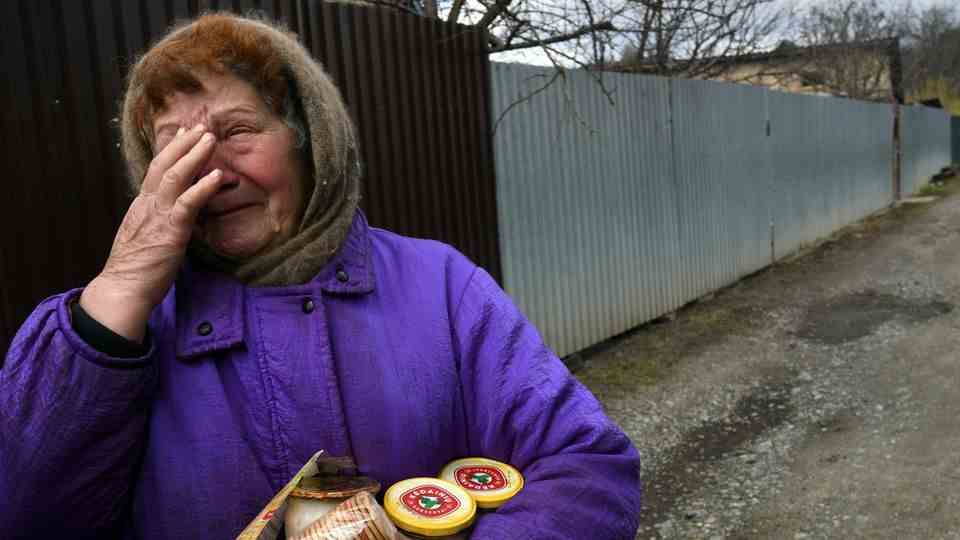anniversary
The day that changed everything: 20 years after the Erfurt school massacre
Silent commemoration in front of the school building in Erfurt on the 19th anniversary of the school massacre at Gutenberg-Gymnasium
© Martin Schutt / Picture Alliance
The horror of Erfurt is now twenty years ago: On April 26, 2002, a former student at the Gutenberg High School shot 16 people. That changes the lives of everyone involved. And also the school system.
Headmistress Christiane Alt has been receiving inquiries about the anniversary of the attack at Erfurt’s Gutenberg-Gymnasium for months. The fact that the media rings every year, “it’s been extremely annoying for 20 years, to put it that way,” says the woman, who was already running the school on the outskirts of Erfurt at the time. This year is particularly stressful. The same questions over and over again.
“It’s irrelevant, I guess, to keep going back to the day’s events. There’s merciless and endless archival material for that. That’s not what this is about. And certainly not after 20 years. So when I’m asked, ‘You can tell me about the day from back then?’ No, I don’t want to talk about it anymore,” says Alt.
On April 26, 2002, a former student at Gutenberg High School killed 16 people. The 19-year-old shoots twelve teachers, one male and one female student, a secretary, a police officer and ultimately himself. It is the first school massacre of this magnitude at a German school. Previously, rampages with guns were a phenomenon familiar from the United States.
A lot has changed since Erfurt
There is no question that the day was traumatic for all 700 students, the teaching staff, the emergency physicians and the police officers. Today, 20 years later, one must rather ask oneself what will result from this for the education system. “Because what happened back then was not unique in Germany. There were repetitions and we cannot rule out that it will happen again.” Events like those in Winnenden or Ansbach in 2009 or most recently in January at the university in Heidelberg come to mind.
A lot has changed since Erfurt. Based on what happened in Erfurt, Thuringia and other federal states have checked the safety of their own schools and installed and expanded warning systems. From Alt’s point of view, this chapter is not closed either. “We all know the desolate financial situation in the education sector or even with the school authorities.”
In addition to the technical requirements, the Thuringian school law was also revised with direct reference to the incident at Gutenberg-Gymnasium. Today it provides that high school students can obtain the Realschule certificate at the end of the tenth grade. The perpetrator was expelled from high school and left without a degree. Since he was of legal age at the time, the school did not inform the parents of their son’s expulsion. That too is different today. Parents of adult students will be informed of special events by the school.
Only after three years again lessons in the building
The more important step for Alt is prevention. According to her own statements, she has been campaigning for schools to have social workers and a school psychological service for almost two decades.
On school days, around 650 students and 60 teachers come and go at the Gutenberg-Gymnasium. After April 26, 2002, extensive reconstruction and conversion work was carried out on the building. The school was not resumed in the house until three years later.
“We were then evicted and then they completely changed the school,” recalls former student Nathalie, now 32. Nathalie is not her real name; to protect your privacy, we changed it. “Then many very popular teachers were gone. And your familiar surroundings – the schoolyard and the tree you loved so much – that was suddenly all gone and different.” Everyday school life was “really bad” for a long time after the fact. Many would have tried to leave school. Nathalie also wanted to change, but it didn’t work. Years later, she still ruled out an apartment near the school. The memory is too painful. She doesn’t like crowds, films with guns bother her. But the memories fade over the years.
Except for 13 teachers, no more eyewitnesses at the school
What has remained constant since 2002 are the annual commemorative events. In 2022, the day will be designed a little differently than in previous years, says headmistress Alt. The victims should be portrayed in more detail in the speeches with parts of their biographies. After 20 years, apart from 13 teachers, there are no more people at the school who are contemporary witnesses.
At its core, commemoration is about being close to the victims, says Alt. Bringing them closer to those who didn’t know them to convey the magnitude of the loss and respect for life. “One day there will be no more contemporary witnesses in the form of teachers. Even then, commemoration will be part of this school.”


